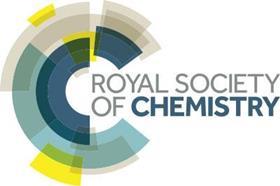Virtual benefit on joining the RSC, 'Polymer' - now and then and Kitchen microwaves - not for the lab
Virtual benefit on joining the RSC

I'd like to highlight to readers that by joining the Royal Society of Chemistry (RSC) they can have access to first-class chemical science information via the RSC Virtual Library (VL) without leaving the classroom. The VL offers a wealth of resources that could help support the teaching of chemistry in schools and colleges.
Alternatives to fossil fuels are in the news at the moment as we all scrutinise our carbon footprints. Through the VL you can search some 500,000 full-text articles from 127 Springer journals for articles on, for example, the conversion of vegetable oil to biodiesel. Alternatively, you can review chapters on nanotechnology for fuel cell applications or on addressing the carbon dioxide dilemma taken from 500 e-book titles.
If you want to offer students a bigger picture of how science works and its impact on society, the VL can help. Using the Ebsco databases you can find business and environmental information on biofuels from millions of full-text articles. You can learn about a green rating system proposed for biofuels or whether palm oil will be Asia's biofuel. You'll also find arguments against the use for biofuels and learn how recently in Mexico the demand for biofuels increased maize prices substantially and led to 'tortilla wars'. Much of this is full-text so you can do the search, find what you want, then read it. All from your home or school/college PC.
With nearly 1000 e-books in chemistry and related issues the VL offers much which might be of interest to you and your students for projects and investigative work. The cosmetic & toiletry formulation handbook tells you what's in, for example, aloe vera night cream, waterless hand cleaners and sun tan lotion. You can follow up these formulations with masses of evaluated data from, for example, Dictionary of substances and their effects. Meanwhile, the e-book version of Bretheric's classic Handbook of reactive chemical hazards will put useful information for risk assessing demonstrations and practicals at your fingertips. There are also many student textbooks available on the VL as e-books, eg Chemical calculations at a glance and Basic concepts in Biochemistry - a student's survival guide (2nd edition).
Licencing agreements between the RSC Library and Information Centre (LIC) and publishers mean that only RSC members can use this resource. Most publishers also restrict downloading of information to research and private study only and do not allow commercial usage. However, this is not an issue for schools and colleges.
LIC staff are on hand to help. If you have difficulty logging on, can't find the information you want or need a tutorial or workshop on how to use the VL, contact us. For information on joining visit the RSC website.
Nigel Lees, Manager RSC LIC, London
'Polymer' - now and then
In his recent Soundbite molecules Simon Cotton states that Kipping 'was quite clear that they [silicones] were polymers'.1 That might be true, but he did not mean what we would today by that term, ie that they were macromolecular.
In 1907, when Kipping was working on silicones, the term polymer was applied to molecules having the same empirical formula but different relative molar masses. For example, benzene was considered to be a polymer of ethyne. It was not until the pioneering work of Hermann Staudinger in 1926-8 that the concept of the macromolecule began to have limited acceptability in chemistry, and even then the issue was not settled completely. That had to wait until Wallace Carothers synthesised nylon in 1935.
If Kipping called silicones 'polymers' (which is doubtful) he meant that they shared an empirical formula with the notional species R2 Si = O. He did not mean they were linear macromolecules based on polysiloxane chains.
I think that all he was clear about was that silicones were not low molar mass molecules. He knew that they were not structurally analogous to ketones, despite their empirical formula.
John Nicholson, University of Greenwich
Kitchen microwaves - not for the lab
While I salute every effort to educate undergraduate students about 'green chemistry' I believe that the experiments in the article, Making triazoles, the green way,2 are dangerous and should not under any circumstances be attempted in a teaching or research laboratory.

Kitchen microwave ovens are not designed for chemistry experiments and are unsafe to be used in the organic laboratory. They offer no protection in case of an explosion, and an explosion is guaranteed with the reactions described in this article. The main reason is the lack of temperature control/monitoring in a kitchen microwave oven. The microwave field is very heterogeneous and hot spots, ie areas of the reaction mixture which have significantly higher temperature than the bulk of the reaction, will always form. With energetic reagents, such as azides and alkynes (their cycloaddition reaction is among the most exothermic of organic reactions) a powerful explosion is very likely to occur. Futhermore, all the organic reagents used - acetylene dicarboxylates and organic azides - are volatile and flammable, and any spark caused by the electrical equipment in the microwave oven (fans, magnetrons, electronic relays) may cause an explosion of the organic/air mixture.
Organic azides and alkynes are safe reagents if handled properly and treated with respect and can be used in a teaching laboratory.3 However, their reactions without a solvent (ie without a heat sink) at uncontrolled elevated temperatures are treacherous.
Valery V. Fokin, The Scripps Research Institute, California, US
Also of interest
Join the Royal Society of Chemistry
Become a member of the Royal Society of Chemistry, the world's leading chemistry community
Contact and Further Information
Royal Society of Chemistry, Burlington House, Piccadilly, London W1J 0BA
Tel: +44 (0) 20 7440 3373
Email: Library and Information Centre
References
- Educ. Chem., 2007,44 (4), 103
- Educ. Chem., 2007, 44 (3), 86
- See for example J. G. Lindberg et al, J. Chem. Educ., 2005, 82 (112), 1833



No comments yet